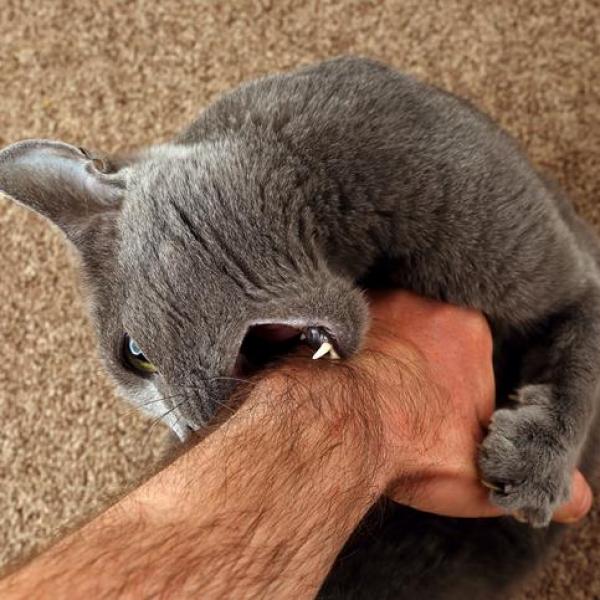If you have one or more cats, you’ve probably been through this situation: your cat licks you gently… and suddenly bites you! What happened? You didn’t like the massage? Why is my cat behaving?
In this article by Animal Expert we will explore a little the feline world and explain why the cat licks and then bites according to the specific behaviors of the species and its meanings. In addition, we’ll also give you some tips to keep the cat from biting you. Read!
- Even if you’re an experienced tutor who knows your pet well.
- It’s not always easy to understand what the cat is telling you.
- It is therefore essential that you learn more about the feline world and the body language of cats.
- Whenever you can.
- Read articles related to ethology (science that studies animal behavior).
- Which will certainly help you better understand the fantastic animals that are cats and interpret certain behaviors more appropriately.
As you know, cats use their bodies to communicate with humans and express their emotions. Therefore, when your best friend licks you and then nibs, you should be very attentive to his body and therefore try to understand why he presents this behavior.
Is it possible that you accidentally frightened him by stroking him? Did your cat lick you as it purred and nibbled gently? The way your cat performs this behavior expresses much more than you can imagine!
There is no single way to interpret tongue strokes, sandwiches and cat bites, so we’ll explain each behavior in detail:
The tongue of cats is undoubtedly unique and special: it consists of small keratin spikes that are especially useful during their cleaning session, to comb hairs and remove all dirt.
Therefore, when a cat licks the guardian or licks his hair, he shows a social behavior, considering it of his social group, as if the tutor were a cat. It is a positive social behavior, which shows a good link between the caregiver and the cat.
In addition, the cat can lick you as a sign of affection, because it has learned that through certain associations, it is a behavior that you like and that provokes more caresses and affection. On the other hand, constantly licking (even compulsively) can mean that something is wrong and that your cat’s well-being is compromised, indicating stress and anxiety. In this case, we recommend that you review the 5 symptoms of stress in the cat.
As with tongue caresses, a bite can also have several meanings. Despite this, anyone who has ever been bitten by a very angry or frightened cat knows that this has nothing to do with the snacks a cat gives when he plays, even if it hurts a little. Cats that are really upset or scared show very expressive body language, contracting and becoming stiff and pointed. In addition, it is common for him to sniff, urinate and bend his back.
This type of bites (accompanied by painful scratches) have absolutely nothing to do with game bites, which they usually do when they become uncontrollable. In addition, there are warning bites to avoid being disturbed or caressed, and bites as a sign of affection, which are usually more controlled and repetitive.
A very common question is why cats bite and lick, the answer is that some cats bite right after licking as a warning sign to stop stroking you. Others do it as a form of affection and others do it as a form of grooming, that is, because they take care of you.
Cats gently clean, lick and bite to cleanse and comb your hair. Therefore, it is quite normal that during a beauty session your partner bites you and that does not mean that it is a negative behavior.
Once you understand why cats bite, it’s important to know what to do when your cat bites and hurts you. First of all, you should never punish him, because your cat has a social behavior, even if it is not pleasant for us.
How should you act when your cat bites you? Ideally, after the bite, stop stroking it and ignore it. If you are always constant and repeat this behavior, over time your cat starts to associate the bites at the end of the game or the caressing session and will know perfectly, that if he does, he will no longer have attention.
At the same time, it is essential that you apply positive reinforcement techniques to reinforce behaviors that please, such as when the cat is calm, licking without biting or purring peacefully. To do this, you can use a simple “very good” or bet on tastiest snacks.
If you would like to read articles similar to, we recommend that you visit our Behavioral Problems section.

